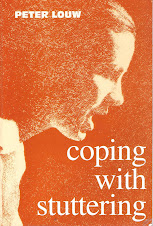I have always been interested in stuttering severity from the viewpoint of the distribution of affected words or sounds within the speaker's vocabulary. From this angle it would appear that there is a spectrum, ranging from individuals who stutter on every (or nearly every) word, to people who only stutter on one or a few words or sounds.
With regard to persons who only stutter on one or a few words/sounds, check out my previous post here. I call them "borderline" stutterers - not much of them is known as they rarely if ever consult a speech therapist, probably because they don't have a big speech problem and don't need therapy. I have only met one of them in my life at a self-help group.
On the other side of the spectrum are those individuals who stutter consistently on every, or nearly every word, irrespective of the situation.
Situational PWS in the majority?
I suspect that the majority of people who stutter find themselves between these two extremes. Most of us seem to be situational stutterers, whose stuttering severity is heavily dependent on the type of situation involved, such as speaking on the telephone, speaking to a group of people, speaking to strangers etc. whereas we can be quite fluent when relaxed.
Those who stutter consistently irrespective of the situation seem to be in a different stress category. If the stress categories laid down by Dr Martin Schwartz are followed, these consistent stutterers can be categorised as "word-stress stutterers", in contrast with "situational-stress stutterers". In the case of the situational stutterer, the learned stress which activates the stutter is linked to a situation, whereas the stress impacting on consistent stutterers is "word stress" - learned (conditioned) stress linked to a specific word. (It could also be "sound stress", which is linked to a specific sound.)
So word stress is the result of a particular word on which stuttering has occurred many, many times in the past. If a person stutters on a particular word (or sound) time and again, it creates a learned pathway in the brain. This is how learning occurs. So the more you stutter, the more deeply the stutter is established. Each stutter reinforces that pathway. So it should be no surprise that you may stutter on that word again in future - the word itself may trigger the stutter.
"Word stress" still not an accepted concept
You won't find references to "word stress" in most textbooks as it is still not an accepted concept within speech therapy, but personally I don't doubt its existence, the reason being that I experienced its workings when younger. For instance, I often had huge problems saying words starting with a "b". However when I did manage to say a word starting with a "b" fluently a few times, they became easier to pronounce.
Similarly I noticed that, after stuttering severely on a b-word, my problems with such words became even worse. This convinced me that word stress indeed exists, that this type of stress is learned and that it can be counteracted and eventually maybe even unlearned by means of fluency techniques that assist in saying difficult words fluently.
Most of us have a mixture of word stress and situational stress, as well as many other forms of stress; but in the case of the "word-stress PWS", word stress is the major stress type impacting on that person. Such a PWS blocks on perhaps every word, the result of years of blocking on those very words.
If you are a word-stress PWS yourself, I hope that this post will have provided some insight in your condition. And insight is the first step on the road to improvement.
UPDATE May 2017: In an opinion poll which ran from February 2014 to April 2017 on this site, 568 people participated. 76% of them said that they were situational stutterers, whereas 24% said that they were word-stress stutterers. For the full results see THIS POST.







No comments:
Post a Comment